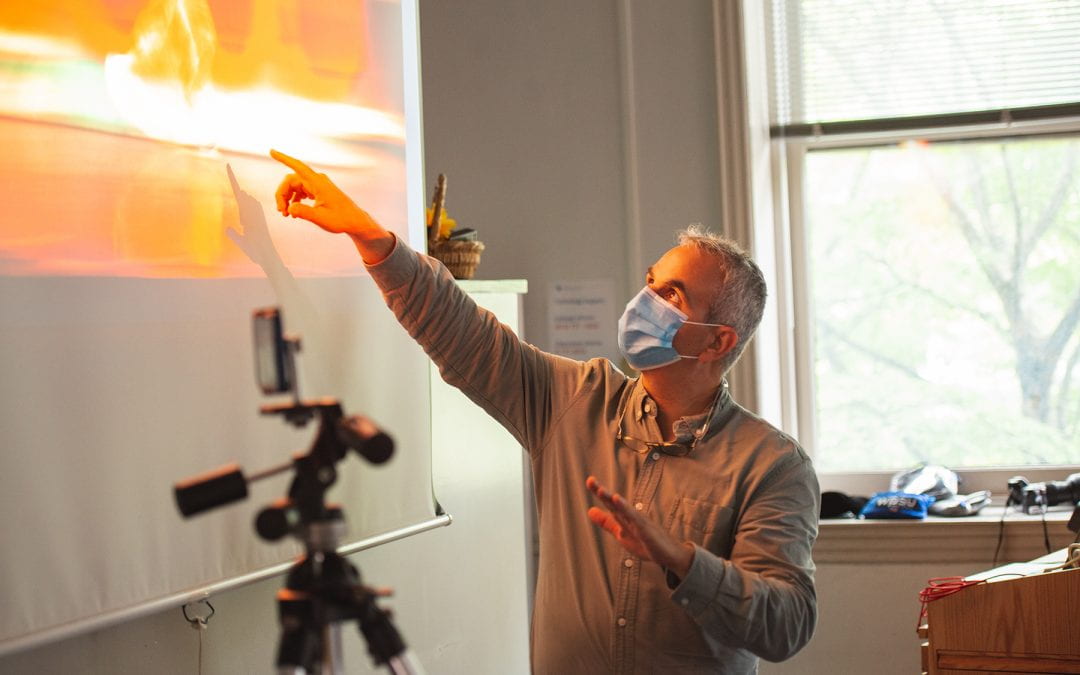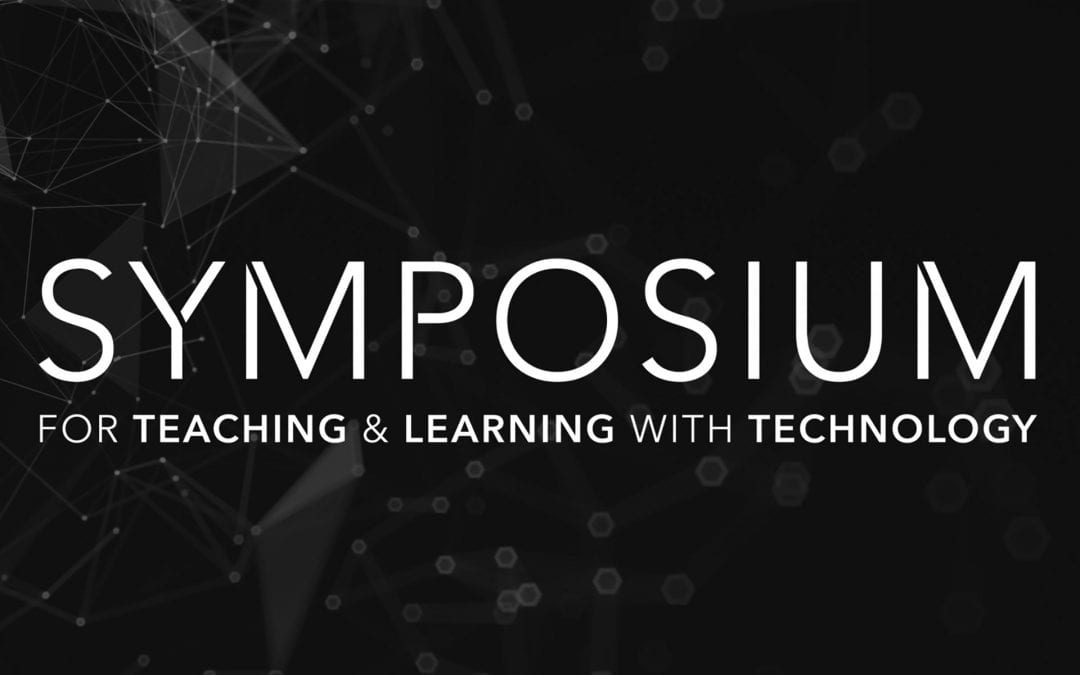
Feb 19, 2021 | Home Page
At Penn State, stories abound regarding the intersection of sound pedagogy, technology, and how the two can work in tandem to improve teaching and learning. “The Dreamery Sessions” podcast helps bring those stories to a wide audience, and today plans were announced for the podcast’s second season.
Season Two of “The Dreamery Sessions” will feature Dr. Renea Nichols, assistant teaching professor in the Bellisario College of Communications as the guest co-host for all four episodes.
From the onset of remote and hybrid teaching brought on by the pandemic, Nichols has implemented creative and innovative practices to keep her students engaged. On “The Dreamery Sessions” she’ll have a chance to share her inspiration, her process, her strategy, her thoughts on where teaching and learning go from here, and much more.
She will join hosts Zach Lonsinger, learning experiences designer with the Creative Learning Initiatives team at Teaching and Learning with Technology (TLT) and Ray Schmitt, public relations specialist with Penn State IT. Their conversations will cover topics that are meant to inspire the Penn State community to explore ways to bring their own creative and innovative ideas to life.
To help get listeners ready for Season Two, a new episode of “The Dreamery Sessions” called The Bridge Episode is available for download and streaming. It features a conversation with Jennifer Sparrow, associate vice president for Teaching and Learning with Technology and deputy chief information officer and full details on what the audience can expect during Season Two.
“The Dreamery Sessions” is available on iTunes and Spotify, and episodes can be streamed on the TLT website.

Feb 1, 2021 | Home Page
Penn State’s Teaching and Learning with Technology (TLT) is making a continuous effort to understand how remote teaching and learning through the coronavirus pandemic has impacted our University community.
A new survey, published today by TLT, aims to gather feedback from faculty and students about their respective experiences with remote and hybrid education. With two versions tailored to each specific audience, the survey has the potential to gather valuable feedback from those who have been impacted most by remote and hybrid instruction.
“Everyone who takes part in this survey will contribute to improving the teaching and learning experience at Penn State,” said Crystal Ramsay, assistant director of innovation with TLT. “By sharing results with academic departments, administrative units, and support units in the spring semester, we’ll still have time to make adjustments.”
“We’re encouraging students and faculty across all Penn State campuses to take part in the specific survey that applies to their role,” added Ramsay.
The student survey aims to assess, among other things, the best way for the University to share resources related to remote learning, what has helped them most with remote learning, what device(s) they use to complete most of their coursework, and what has been challenging about remote learning.
Meanwhile, faculty will be able to provide feedback on items such as challenges in adapting course design, teaching tools and resources they would like to explore further, and their biggest concerns related to remote teaching.
Both faculty and students can expect to spend fewer than 15 minutes completing the survey. The window for responses will be open from February 1, 2021, to February 12, 2021.
Penn State students should take this version of the survey and faculty should take this version of the survey.

Jan 21, 2021 | Home Page, Uncategorized
New Student Orientation is a vital asset for incoming students designed to prepare them for all aspects of college life – everything from setting academic goals to being a good member of their campus community. The multi-day event helps get them on the right path for their time as a Penn State student.
As senior associate director for New Student Orientation (NSO), Katie Motycki has led orientation at Penn State since 2013 and knows a thing or two about what makes it successful. When the decision was made to change NSO to an online experience because of the pandemic, she turned to learning designers in Teaching and Learning with Technology (TLT) to help make it happen.
Boring handouts and endless links to read? Not on her watch. Motycki wanted Virtual Student Orientation to replicate the rich in-person experience she would otherwise plan. And she wanted it in Canvas, the learning management system students use for their classes.
“Since Canvas is such a huge part of the undergraduate experience, we knew that was something we should be using,” Motycki said.
Angie Dick, Learning Design manager in TLT, said her team was up for the challenge and honored to be involved in a project impacting every new student. Still, the project work was extensive and they were facing a tight timeline.
“We made a conscientious effort to build a virtual learning space where students would feel welcome and a part of their new campus,” she said.
Amy Kuntz and Jessie Driver, learning designers on Dick’s team, stepped up to lead the work. Kuntz said they created seven standard modules for all students based on a table of contents from Motycki. Those modules covered such things as the business of being a student; dining and residence life; health and safety; preparing for academic advising; sexual misconduct education; and diversity, equity, and inclusion.
Each module had learning objectives, and Kuntz and Driver used them to develop an assessment to test students’ understanding of the key concepts before they could move on to the next module.
They also created an additional module for 13 colleges and 19 campuses, with input from academic advisers in those areas. Each highlighted specific information incoming students in those locations needed to know, such as majors offered, GPA requirements, and other unique features.
“In the College of Earth and Mineral Sciences, for example, they only have about 300 entering students a year,” Driver said. “They intentionally keep the classes smaller, and the faculty and advisers really get to know the students. So the module for EMS included that.”
Finally, they created a standardized parent and family module that addressed topics they needed to know to support their student, such as tuition and billing, an academic overview, health and safety resources, and more.
Kuntz said she and Driver developed guidelines for what could be submitted and the formats to use, so academic advisers had a starting point to help them pull together information.
“We worked many nights and during the weekends to get everything done in the quick turnaround time. Not only did we have to put information into the Canvas modules, but we were working with the advisers across the Commonwealth to make sure what they submitted would work and offering drop-in hours and consultations to help them,” Kuntz said.
Media Commons Consultant Nate Ulrich also was involved, taking apart an interactive musical theater show put on by Penn State theater students called “Results Will Vary*.” One performance of the show was filmed at an NSO session last year by WPSU, and Ulrich edited about 15 clips from the raw video recording to embed in one of the modules.
Ulrich said the production covered sensitive topics such as alcohol abuse and sexual harassment.
When all was said and done, more than 250 staff from across the Commonwealth were engaged in some way in contributing to deliver a successful Virtual Orientation program welcoming 17,000 new students to Penn State in 2020.
“It’s safe to say we would not have been able to deliver the high-quality program we did without IT,” Motycki said. “Sure, we could have come up with a website of information, but it wouldn’t have been in Canvas in a way that was as thoughtfully designed. When you talk about things that take a village, this was truly a University-wide effort. The collaborative spirit to make it happen was remarkable.”

Nov 9, 2020 | Home Page
From May 11 to 13, the Penn State community will come together in a virtual format to take part in the annual Symposium for Teaching and Learning with Technology. The free event offers an abundance of programming to share ideas and methods with the power to transform education.
“We chose to hold this year’s TLT Symposium virtually out of an abundance of caution, and with the safety of presenters and attendees as the top priority,” said Jennifer Sparrow, associate vice president for Teaching and Learning with Technology. “Also, the later date for the event will fit well into our adjusted academic calendar and allow interested presenters additional time to submit their proposals.”
Katherine Milkman, an award-winning researcher and Evan C. Thompson Endowed Term Chair for Excellence in Teaching at the University of Pennsylvania, will present the keynote address for the 2021 Symposium on May 11.
“Katherine was scheduled to join us for the 2020 TLT Symposium, but many circumstances resulted in her presentation being postponed to this year,” said Sparrow. “It will be worth the wait to hear her speak because her expertise in researching ways to change consequential behaviors is so relevant to our current circumstances.”
Along with her work at U Penn, Milkman has published articles in journals such as The Journal of Finance, Management Science, and Proceedings of the National Academy of Sciences. She has penned a number of columns for The Washington Post on the behavioral economics of everyday life, and hosts a Charles Schwab podcast titled, “Choiceology with Katy Milkman.”
Additionally, Milkman co-directs the Behavior Change for Good Initiative at the University of Pennsylvania. That program’s work is being chronicled by former Symposium speaker Stephen Dubner’s podcast, “Freakonomics Radio.”
Registration for the 2021 Symposium is now open, and the event is free for all Penn State faculty, students, and staff.

Sep 10, 2020 | Home Page
Teaching and Learning with Technology (TLT) is searching for Penn State faculty who work at the intersection of technology and pedagogy to improve teaching and learning. Those who do can be nominated for the 2021 TLT Impact Award.
The call for nominations for the 2021 TLT Impact Award is open now through Friday, October 16. Given annually, the TLT Impact Award recognizes excellence in teaching and learning at Penn State and celebrates cross-disciplinary projects, courses, and collaborations that have positively enhanced teaching, learning, and the use of learning spaces across the University and beyond.
Penn State tenure-line faculty or non-tenure-line teaching faculty are eligible for nomination. University faculty, staff, and students can submit nominations, and self-nominations also are welcome.
The TLT Impact Award includes a commemorative medal, a $3,000 cash award, an invitation to serve as a TLT ambassador, and additional support to extend the impact of the recipient’s work.
Last year, Pierce Salguero, associate professor of Asian history and religious studies at Penn State Abington, received the TLT Impact Award.
More information can be viewed on the Impact Award’s webpage.




